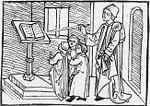Parochial school
Template:Toofewopinions A parochial school (also known as a faith school or a sect school) is a type of school which engages in religious education in addition to conventional education. Parochial schools are typically grammar schools or high schools run by churches or parishes.
United Kingdom
In British education, parish schools from the established church of the relevant constituent country formed the basis of the state-funded education system, and many schools retain a church connection while essentially providing secular education in accordance with standards set by the government of the country concerned. These are often primary schools, and may be designated as name C.E. School or name C.E. (Aided) School, depending on whether they are wholly or partly funded by the church (the latter is more common).
English education includes many schools linked to the Church of England which sets the ethos of the school and can influence selection of pupils where there is competition for places. These form a large proportion of the 6,955 Christian faith schools in England. The Roman Catholic church also maintains schools. In addition, there are 36 Jewish, seven Muslim and two Sikh faith schools. Faith schools follow the same national curriculum as state schools. Religious education in Church of England schools is monitored by the local Diocese, but does not typically take up much more of the timetable than in secular schools.
Despite protests by scientists, bishops and politicians, the government has so far not prohibited the teaching of creationism or intelligent design in City Academies as long as National Curriculum guidelines on teaching evolution are met. [citation needed] There is a debate over the question of whether faith schools should get government funding, with an ICM poll in August 2005 finding 64% of the public believe that "the government should not be funding faith schools of any kind". It also found a significant part of the population against faith based schools being legal at all, citing potential damages to a multicultural society as their main reason. A petition exists on the Downing Street website to abolish state funding and prohibit the teaching of creationism and other religious mythology as fact in schools.
Public education in Scotland was pioneered by the Church of Scotland, which handed over their parish schools to the state in 1872. Charitably funded Roman Catholic schools were brought into the state system by the Education (Scotland) Act 1918, introducing state funding of Catholic schools which kept their distinct religious education, access to schools by priests and requirement that school staff be acceptable to the Church. The Catholic schools remain as faith schools, but the other schools are effectively secular and are known as "non-denominational" schools.
United States
In the United States the term "parochial school" can refer to a school run by any religious organization. In some regions, the term is used specifically to refer to schools attached to Roman Catholic parishes. In those areas, "parochial" is used to distinguish a school operated by a Catholic church from one operated by a Protestant church. The Catholic parochial school system developed in the nineteenth century as a response to what was then seen as Protestant domination of the public school system in the United States. [1]
See also
- Charter school
- Christian school
- Catholic school
- Jewish day school
- Madrasah
| Schools |
|---|
| Education |
| History of education |
| Pedagogy |
| Teaching |
| Homeschooling |
| Preschool education |
| Child care center |
| Kindergarten |
| Primary education |
| Elementary school |
| Secondary education |
| Middle school |
| Comprehensive school |
| Grammar school |
| Gymnasium |
| High school |
| Preparatory school |
| Public school |
| Tertiary education |
| College |
| Community college |
| Liberal arts college |
| University |
External links
- National Parochial School Directory (US)
- Catholic Parochial School statistics 1993-4 (US)
- The Guardian, 23 August 2005, "Two thirds oppose state aided faith schools" in United Kingdom
- UK Government Petition Website - Faith Schools [2]
Credits
New World Encyclopedia writers and editors rewrote and completed the Wikipedia article in accordance with New World Encyclopedia standards. This article abides by terms of the Creative Commons CC-by-sa 3.0 License (CC-by-sa), which may be used and disseminated with proper attribution. Credit is due under the terms of this license that can reference both the New World Encyclopedia contributors and the selfless volunteer contributors of the Wikimedia Foundation. To cite this article click here for a list of acceptable citing formats.The history of earlier contributions by wikipedians is accessible to researchers here:
The history of this article since it was imported to New World Encyclopedia:
Note: Some restrictions may apply to use of individual images which are separately licensed.
